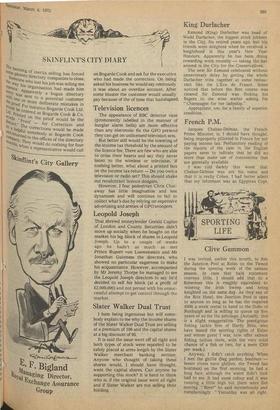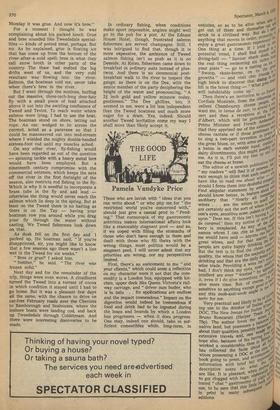Clive Gammon
I was invited, earlier this month, to fish the Junction Pool at Kelso on the Tweed during the opening week of the salmon season. In case that bald statement conveys little, I should add that to a fisherman this is roughly equivalent to winning the Irish Sweep and being knighted on the same day. As they say of the Ritz Hotel, the Junction Pool is open to anyone so long as he has the required £600 a week rental to hand to the Duke of Roxburgh and is willing to queue up five years or so for the privilege. (Actually, this is a slight exaggeration. The prestigious fishing tackle firm of Hardy Bros, who have leased the sporting rights of Kelso and whose guest I was, now offer salmon fishing tuition there, with the very solid chance of a fish or two, for a mere £200 per week.) Anyway, I didn't catch anything. When I met the ghillie (beg pardon, boatman — lesser rivers have ghillies, the Tweed has boatmen) on the first morning, he had a long face, although the water didn't look bad to me. It had some colour and it was running a little high but there were fish moving. " Bree!" he said mysteriously and complainingly. "Yesterday was all right. Monday it was grue. And now it's bree."
For a moment I thought he was complaining about his packed lunch. Grue and bree sounded like Tweedsdale specialities — kinds of potted meat, perhaps. But no. As he explained, grue is floating ice that has come up from the bottom of the river after a cold spell; bree is what they call snow broth in other parts of the country. The thaw had melted the big drifts west of us, and the very cold ' resultant was flowing into the river. Salmon, the boatman told me, never take when there's bree in the river.
But I went through the motions, hurling out the massive, three-inch-long deer-hair fly with a small piece of lead attached above it out into the swirling confluence of Tweed and Teviot. To reach water where salmon were lying, I had to use the boat. The boatman stood on shore, letting out rope. An oar, wedged to lie across the current, acted as a paravane so that I could be manoeuvred out into mid-stream where I wielded the mighty double-handed sixteen-foot rod until my muscles ached. On any other river, fly-fishing would have been regarded as out of the question — spinning tackle with a heavy metal lure would have been employed. But a nineteenth century compromise with the commercial netsmen, which keeps the nets off the river in the first fortnight of the season, also restricts rod fishing to the fly. Which is why it is needful to incorporate a brass tube in the fly and add lead — otherwise the thing would never reach the salmon which lie deep in the spring. But at least on the Tweed there is no harling as there is on the Tay — having your boatman row you around while you drag your fly through the water without casting. We Tweed fishermen look down on that.
As dusk fell on the first day and I packed up, the boatman said, "If you're disappointed, sir, you might like to know that a few seasons ago there wasn't a line wet in the Tweed for six weeks." " Bree or grue?' I asked him. " Neither," he said. "The river was frozen solid."
Next day and for the remainder of the trip, things were even worse. A cloudburst turned the Tweed into a torrent of cocoa in which condition it stayed until I had to go home. But it was a pleasant few days all the same, with the chance to drive on car-free February roads over the Cheviots to Bamborough and Seahouses, where the inshore boats were landing cod, and back up Tweedsdale through Coldstream. And there were interesting discoveries to be made. In ordinary fishing, when conditions make sport impossible, anglers might well go to the pub for a pint. At the Ednam House Hotel, though, frustrated salmon fishermen are served champagne. Still, I was intrigued to find that, though it is more expensive, the ambience of Tweed salmon fishing isn't as posh as it is on Deeside. At Kelso, fishermen came down to breakfast in ordinary suits instead of plustwos. And there is no ceremonial postbreakfast walk to the river to inspect the gauge, as there is on the Dee, with the senior member of the party deciphering the height of the water and pronouncing, "A 21 inch gold and yellow minnow today, gentlemen." The Dee ghillies, too, it seemed to me, were a lot less independent than the Tweed boatmen and much more eager for a dram. Yes, indeed. Should another Tweed invitation come my way I shall more than likely accept it.











































 Previous page
Previous page